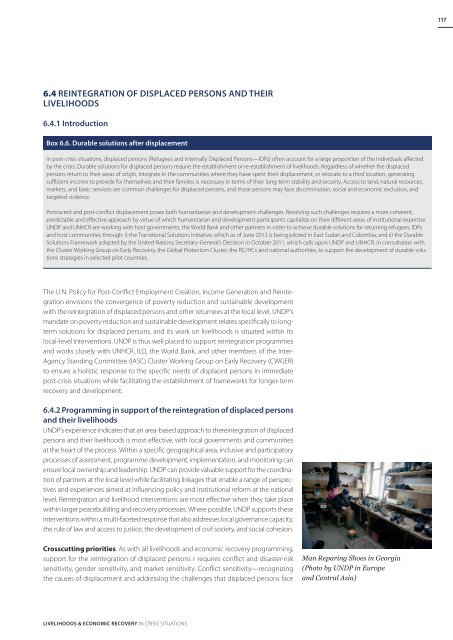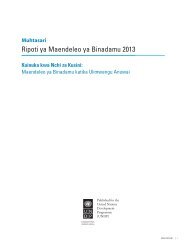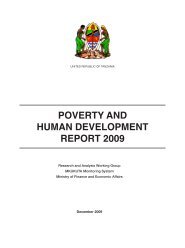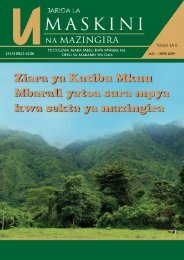Download PDF (4.08 MB) - ReliefWeb
Download PDF (4.08 MB) - ReliefWeb
Download PDF (4.08 MB) - ReliefWeb
Create successful ePaper yourself
Turn your PDF publications into a flip-book with our unique Google optimized e-Paper software.
117<br />
6.4 REINTEGRATION OF DISPLACED PERSONS AND THEIR<br />
LIVELIHOODS<br />
6.4.1 Introduction<br />
Box 6.6. Durable solutions after displacement<br />
In post-crisis situations, displaced persons (Refugees and Internally Displaced Persons—IDPs) often account for a large proportion of the individuals affected<br />
by the crisis. Durable solutions for displaced persons require the establishment or re-establishment of livelihoods. Regardless of whether the displaced<br />
persons return to their areas of origin, integrate in the communities where they have spent their displacement, or relocate to a third location, generating<br />
sufficient income to provide for themselves and their families is necessary in terms of their long-term stability and security. Access to land, natural resources,<br />
markets, and basic services are common challenges for displaced persons, and these persons may face discrimination, social and economic exclusion, and<br />
targeted violence.<br />
Protracted and post-conflict displacement poses both humanitarian and development challenges. Resolving such challenges requires a more coherent,<br />
predictable and effective approach by virtue of which humanitarian and development participants capitalize on their different areas of institutional expertise.<br />
UNDP and UNHCR are working with host governments, the World Bank and other partners in order to achieve durable solutions for returning refugees, IDPs<br />
and host communities through: i) the Transitional Solutions Initiative, which as of June 2012 is being piloted in East Sudan and Colombia; and ii) the Durable<br />
Solutions Framework adopted by the United Nations Secretary-General’s Decision in October 2011, which calls upon UNDP and UNHCR, in consultation with<br />
the Cluster Working Group on Early Recovery, the Global Protection Cluster, the RC/HCs and national authorities, to support the development of durable solutions<br />
strategies in selected pilot countries.<br />
The U.N. Policy for Post-Conflict Employment Creation, Income Generation and Reintegration<br />
envisions the convergence of poverty reduction and sustainable development<br />
with the reintegration of displaced persons and other returnees at the local level. UNDP’s<br />
mandate on poverty reduction and sustainable development relates specifically to longterm<br />
solutions for displaced persons, and its work on livelihoods is situated within its<br />
local-level interventions. UNDP is thus well placed to support reintegration programmes<br />
and works closely with UNHCR, ILO, the World Bank, and other members of the Inter-<br />
Agency Standing Committee (IASC) Cluster Working Group on Early Recovery (CWGER)<br />
to ensure a holistic response to the specific needs of displaced persons in immediate<br />
post-crisis situations while facilitating the establishment of frameworks for longer-term<br />
recovery and development.<br />
6.4.2 Programming in support of the reintegration of displaced persons<br />
and their livelihoods<br />
UNDP’s experience indicates that an area-based approach to thereintegration of displaced<br />
persons and their livelihoods is most effective, with local governments and communities<br />
at the heart of the process. Within a specific geographical area, inclusive and participatory<br />
processes of assessment, programme development, implementation, and monitoring can<br />
ensure local ownership and leadership. UNDP can provide valuable support for the coordination<br />
of partners at the local level while facilitating linkages that enable a range of perspectives<br />
and experiences aimed at influencing policy and institutional reform at the national<br />
level. Reintegration and livelihood interventions are most effective when they take place<br />
within larger peacebuilding and recovery processes. Where possible, UNDP supports these<br />
interventions within a multi-faceted response that also addresses local governance capacity,<br />
the rule of law and access to justice, the development of civil society, and social cohesion.<br />
Crosscutting priorities. As with all livelihoods and economic recovery programming,<br />
support for the reintegration of displaced persons r requires conflict and disaster-risk<br />
sensitivity, gender sensitivity, and market sensitivity. Conflict sensitivity—recognizing<br />
the causes of displacement and addressing the challenges that displaced persons face<br />
Man Reparing Shoes in Georgia<br />
(Photo by UNDP in Europe<br />
and Central Asia)<br />
Livelihoods & Economic Recovery in Crisis Situations





